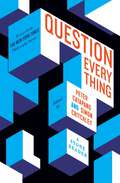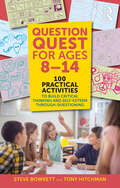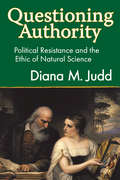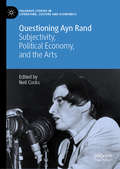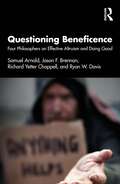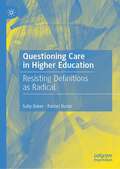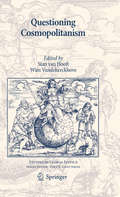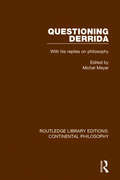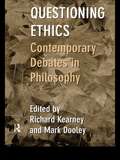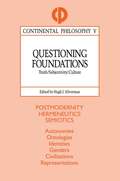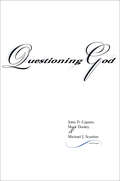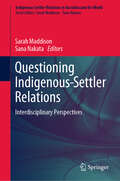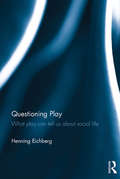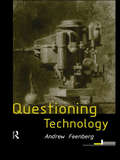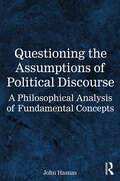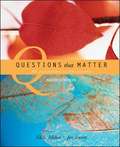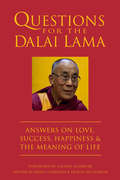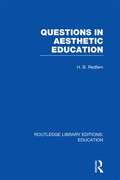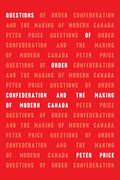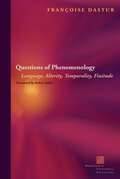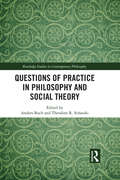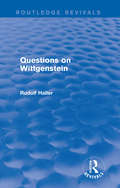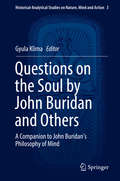- Table View
- List View
Question Everything: A Stone Reader
by Peter Catapano and Simon CritchleyAn essential addition to the Stone Reader series, Question Everything is a groundbreaking collection of philosophical essays from some of our foremost thinkers and storytellers. When The Stone Reader—a landmark collection of 133 essays from the New York Times’ award-winning philosophy column—first published, in 2015, the world urgently needed insight and wisdom, and for many, the book served as a bulwark of reason against the rising tide of post-fact rhetoric. Now, as disinformation continues to run rampant and our rights are increasingly called into question, editors Peter Catapano and Simon Critchley contend that philosophy in the public sphere is more crucial than ever. Like The Stone Reader and its sequel, Modern Ethics in 77 Arguments, Question Everything delivers the contrarian views, sound arguments, and creative approaches to traditional opinion-writing that loyal readers of the series have come to expect. Its essays, however, are not organized by traditional categories like ethics or epistemology, but thematically by question, thirteen of them in all—the first twelve like the hours of a clock, ticking us through the tumultuous time in which these pieces were written, from late 2015 to 2021, with the last speculating into an uncertain future. The volume begins with the most fundamental of questions: What does it mean to be human? There, contemporary thinkers from Martha Nussbaum to Bernard-Henri Lévy explore the essence of who we are as a species. The next question—Is democracy possible?—interrogates our social and political ideals. While Malka Older calls into question the viability of our institutions, philosophers Gary Gutting and Alex Rosenberg reassess the meaning of patriotism. And onward, with more timeless struggles: What is happiness? Does life have meaning? Finally, it asks, Is this the end of the world as we know it? Now what? While its foundation and core consists of the work of professional scholars and philosophers, Question Everything also features a number of prominent artists and thinkers who may never appear on a philosophy syllabus, including, among others, novelist Elena Ferrante, actor Cate Blanchett, filmmaker Errol Morris, musician Sonny Rollins, and artist Ai Weiwei, all of whom offer insights shaped by decades of devotion to and practice of their crafts. Designed both for immediate gratification and long-term use, Question Everything, with an introduction by Catapano, is not only an essential addition to a much-loved series, but an act of resistance, “a product,” as Catapano writes, “of the spirit of agitation and inquiry that has been integral to the human enterprise from the beginning of recorded history.”
Question Quest for Ages 8-14: 100 Practical Activities to Build Critical Thinking and Self-Esteem Through Questioning
by Steve Bowkett Tony HitchmanThe ability to ask incisive questions is a powerful skill set that children can acquire and develop if the classroom and whole-school environments support it. This essential book offers a range of engaging and inclusive activities that promotes children’s questioning and feeds their natural sense of curiosity and wonder. Question Quest explores the various types of questions that can be asked in a number of educational contexts, from the point of view of both teachers and pupils. Packed with 100 practical activities, the book seeks to boost children’s self-confidence in asking questions and provides the tools to establish a ‘questioning classroom’ where asking questions is encouraged and celebrated in order to enhance children’s learning. With clear and practical explanations, the authors argue how questioning is an intelligent behaviour that is essential in nurturing children’s innate desire to learn constantly. Topics covered include: Establishing a questioning classroom Questioning and creativity Questions and creative writing Conducting a discussion Philosophical enquiry Questioning and life coaching This book is a key resource for any school, teacher or parent looking to foster and develop critical thinking skills in children and young people.
Questioning Allegiance: Resituating Civic Education
by Liz JacksonEducation about living in society and in the world is a vital task of schools. Yet such civic education is not always critically examined, and few among us have been encouraged to reflect on our civic education experiences. Around the world, one’s civic education most often looks like a black box. How it works is unclear. When human harm, violence, and oppression can be seen in a wide variety of contexts, it is worth critically examining civic education. Could it be that civic education is not playing a helpful role in society? Can it be done differently and better? As one reflects on the contemporary social world, it is helpful to examine the assumptions surrounding education for living together, to think about current modes and possible alternatives. Otherwise, one might end up promoting allegiance to civic and partisan entities which are themselves black boxes (the ‘nation’, the ‘people’), failing to notice when and how what goes on in civic education is morally questionable.This book aims to elucidate some of the black box of civic education, and focuses on some of its main operations across contexts. Offering a new framework for students and academics, this book questions existing thinking and shifts the focus of attention from the right balance to strike between local, national, and global allegiances to the more fundamental question of what counts as ‘local’, ‘national’, and ‘global’, and what might be involved in cultivating allegiances to them. It looks at allegiance to not just transnational but also sub-global ‘civilisations’ and it problematises the notion of the ‘local community’ in new ways.This book is the 2020 AESA Critics' Choice Book Award Winner.
Questioning Authority: Political Resistance and the Ethic of Natural Science
by Diana M. JuddThe West is currently witnessing the slow destruction of the classical liberal tradition. The casualties are reason, the willingness to question political or religious authority, and the validity of natural science. Replacing these are a crippling intellectual relativism, political apathy, and a grave misunderstanding of natural science and its concomitant ethic. In this work, Diana M. Judd gets to the root of the matter by directly addressing the following questions: What is modern natural science? What effect did it have on how we think about politics? What are the dangers surrounding the marginalization of natural science and the liberal intellectual and political tradition? This is a work of political theory. It seeks to engage the political by addressing the question first posed by the ancient Greeks: How ought we to live? If we have indeed entered the age of endarkenment where religious dogma, intellectual apathy, and unquestioned authority increasingly hold sway, there is a need now, more than ever, to explore the meaning and significance of the origins of the modern political and scientific traditions Americans take for granted. It is from these traditions that Americans received the ideas of legitimate political resistance, reason, individual rights, religious freedom, and natural science. The importance of modern natural science and its relationship to these tenets of classical liberalism is the central concern of this book. Claims that science is dogmatic and ideological, and that the tenets of liberalism divide individuals, have become commonplace. It is Judd's intention to show how these claims err, by exploring what natural science is and how it evolved. This ethic centers on the radical idea that authority must be questioned. We ignore this to our peril. If individuals do not question what leaders say, we abdicate the rights and responsibility of self-rule and individual freedom.
Questioning Ayn Rand: Subjectivity, Political Economy, and the Arts (Palgrave Studies in Literature, Culture and Economics)
by Neil CocksQuestioning Ayn Rand: Subjectivity, Political Economy, and the Arts offers a sustained academic critique of Ayn Rand’s works and her wider Objectivist philosophy. While Rand’s texts are often dismissed out of hand by those hostile to the ideology promoted within them, these essays argue instead that they need to be taken seriously and analysed in detail. Rand’s influential worldview does not tolerate uncertainty, relying as it does upon a notion of truth untroubled by doubt. In contrast, the contributors to this volume argue that any progressive response to Rand should resist the dubious comforts of a position of ethical or aesthetic purity, even as they challenge the reductive individualistic ideology promoted within her writing. Drawing on a range of sources and approaches from Psychoanalysis to The Gold Standard and from Hannah Arendt to Spiderman, these essays consider Rand’s works in the context of wider political, economic, and philosophical debates.
Questioning Beneficence: Four Philosophers on Effective Altruism and Doing Good
by Jason F. Brennan Richard Yetter Chappell Ryan W. Davis Samuel ArnoldEffective Altruism is a movement and a philosophy that has reinvigorated the debate about the nature of beneficence. At base, it is the consistent application of microeconomic principles to beneficent action. The movement has exposed that many forms of giving do little good (or do active harm), but others do tremendous good.Questioning Beneficence uses Effective Altruism as a launch pad to ask hard questions about beneficence more generally. Must we be Effective Altruists, or are Effective Altruism and the ideas driving the movement a mistake? How much should we give—if anything— and how should we give it? What are the respective roles of different kinds of institutions? Is charity anti-democratic and do billionaire philanthropists have too much power? Is Effective Altruism just utilitarianism in disguise?Questioning Beneficence is written by four philosophers, each with distinct points of view. It introduces a new standard for debating ideas in philosophy as each author poses and answers three questions and each of his three co-authors responds to those questions in turn. Finally, the first author replies to his co-authors’ responses. Throughout the book, there is a spirit of curiosity, intellectual risk taking, and truth-seeking, rather than point-scoring and one-upmanship. This book demonstrates what open-minded, real dialogue on an important issue can be at its very best.Key Features: Introduces a new roundtable format for philosophical debates: each of four authors takes the lead in constructing and answering three questions, each co-author then responds, and the first author then replies to the others’ responses. Explores salient philosophical questions raised by beneficence, like Can philanthropy be undemocratic? Why are people so bad at charity and what can we do about it? How important is beneficence compared to other values? Can Effective Altruism be part of a meaningful moral life? Consistently written in a clear and engaging style, suitable for both undergraduate students and curious general readers
Questioning Care in Higher Education: Resisting Definitions as Radical
by Rachel Burke Sally BakerThis book explores questions of care in higher education. Using Joan Tronto’s seven signs that institutions are not caring well, the authors examine whether students and staff consider universities to be caring institutions. As such, they outline how universities systematically, structurally, and actively ‘undercare’ when it comes to supporting students and staff, a phenomenon which was amplified by the COVID-19 pandemic. Drawing on scholarly ideas from the sociology of care, higher education, social justice, and feminist critique, and in dialogue with empirical insights gathered with people who work and study in universities in Australia, South Africa, and the UK, the book questions why people care, as well as why adopting a caring position in higher education can be viewed as radical. The authors conclude by asking what we can do to counter that view by thinking carefully about the purpose, power, and plurality of care, before imagining how we can create more caring universities.
Questioning Cosmopolitanism
by Wim Vandekerckhove Stan Van HooftThis book aims to provide cutting edge essays by leading scholars on cosmopolitanism. Cosmopolitanism is an emerging movement in global ethics and provides a meeting point between theorists of international law, political science, political philosophy, applied ethics, economics, development studies, and international relations. The second International Conference of the International Global Ethics Association will be held in Melbourne, Australia in June 2008 on the theme of 'Questioning Cosmopolitanism' and will attract major scholars from around the world. It is envisaged that the best essays from this conference will be published in the proposed book.
Questioning Derrida: With His Replies on Philosophy (Routledge Library Editions: Continental Philosophy #9)
by Michel MeyerThis title was first published in 2001. Derrida's work testifies to the problematic state of contemporary thought. Questioning Derrida offers new explorations into Derrida's contribution to philosophy. Presenting contributions from prominent philosophers worldwide, this book explores many aspects of Derrida's philosophical perspective. With contributors commenting on a particular topic or defending alternative viewpoints, this book examines the work of Plato, Hegel, Aristotle, Heidegger and also the philosophy of science. Focusing on 'problematology' - a conception of philosophy as questioning - the contributors explore this new way of 'doing' philosophy. Including a concluding chapter from Derrida himself, this book presents Derrida in question and Derrida and his answers and opens new debate for readers across the fields of philosophy and literature, particularly those exploring the work of Derrida, issues in continental philosophy, and the theory of questioning. Michel Meyer is Director of the Revue Internationale de Philosophie journal and based at Université Libre de Bruxelles, Belgium. He is also the series editor of Ashgate's Philosophy in Question series which is published in association with Revue Internationale de Philosophie from which the volumes in the series evolve.
Questioning Ethics: Contemporary Debates in Continental Philosophy
by Mark Dooley Richard KearneyThis major discussion takes a look at some of the most important ethical issues confronting us today by some of the world’s leading thinkers. Including essays from leading thinkers, such as Jurgen Habermas, Alasdair MacIntyre, Julia Kristeva and Paul Ricoeur, the book’s highlight – an interview with Jacques Derrida - presents the most accessible insight into his thinking on ethics and politics for many years. Exploring topics ranging from history, memory, revisionism, and the self and responsibility to democracy, multiculturalism, feminism and the future of politics, the essays are grouped into five thematic sections: * hermeneutics * deconstruction * critical theory * psychoanalysis * applied ethics. Each section considers the challenges posed by ethics and how critical thinking has transformed philosophy today. Questioning Ethics affords an unsurpassed overview of the state of ethical thinking today by some of the world’s foremost philosophers.
Questioning Foundations: Truth, Subjectivity and Culture (Continental Philosophy #No. 5)
by Hugh J. SilvermanFirst published in 1993. Routledge is an imprint of Taylor & Francis, an informa company.
Questioning God (Indiana Series in the Philosophy of Religion)
by John D. Caputo, Mark Dooley and Michael J. ScanlonJacques Derrida and other scholars explore postmodern thinking about God and consider the nature of forgiveness in relation to the paradoxes of the gift. In fifteen insightful essays, Jacques Derrida and an international group of scholars explore the implications of deconstruction for religion, focusing on two topics: God and forgiveness. Among the themes addressed by contributors are the possibilities of imagining God as unthinkable, imagining God as nonpatriarchal, imagining a return to Augustine, and imagining an age in which praise is far more important than narrative. Questioning God moves readers beyond the parameters of metaphysical reason and modernist rationality as it attempts to think the questions of God and forgiveness in a postmodernist context. Contributors include John D. Caputo, Jacques Derrida, Mark Dooley, Francis Schüssler Fiorenza, Robert Gibbs, Jean Greisch, Kevin Hart, Richard Kearney, Cleo McNelly Kearns, John Milbank, Regina M. Schwartz, Michael J. Scanlon, and Graham Ward. &“What sets this work apart from the majority of other publications on the subject of postmodern theology and prevents it from descending into a sanctimonious hagiography of Derrida&’s genius is the presence among the contributors of Graham Ward and John Milbank, two of the founding members of the movement known as radical orthodoxy. This present work is the first to document supporters of radical orthodoxy critically engaging with proponents of Derridean deconstruction.&” —Perspectives
Questioning Indigenous-Settler Relations: Interdisciplinary Perspectives (Indigenous-Settler Relations in Australia and the World #1)
by Sarah Maddison Sana NakataThis book examines contemporary Indigenous affairs through questions of relationality, presenting a range of interdisciplinary perspectives on the what, who, when, where, and why of Indigenous–settler relations. It also explores relationality, a key analytical framework with which to explore Indigenous–settler relations in terms of what the relational characteristics are; who steps into these relations and how; the different temporal and historical moments in which these relations take place and to what effect; where these relations exist around the world and the variations they take on in different places; and why these relations are important for the examination of social and political life in the 21st century.Its unique approach represents a deliberate move away from both settler-colonial studies, which examines historical and present impacts of settler states on Indigenous peoples, and from postcolonial and decolonial scholarship, which predominantly focuses on how Indigenous peoples speak back to the settler state. It explores the issues that inform, shape, and give social, legal, and political life to relations between Indigenous and non-Indigenous peoples, both in Australia and globally.
Questioning Matters: an Introduction to Philosophical Inquiry
by Daniel KolakQuestioning Matters is an accessible, provocative collection of readings organized around central topics that are solidly grounded in classical, foundational issues, but relevant to today’s world. Kolak’s compilation emphasizes philosophical reasoning processes and methods more than any other anthology. The focus is on learning to ask the right questions and to analyze and formulate arguments; an underlying theme is that philosophy is not merely a collection of views and theories, but an activity as relevant to the timeless issues of existence as the practical concerns of today.
Questioning Play: What play can tell us about social life
by Henning EichbergWhat is play? Why do we play? What can play teach us about our life as social beings? In this critical investigation into the significance of play, Henning Eichberg argues that through play we can ask questions about the world, others and ourselves. Playing a game and asking a question are two forms of human practice that are fundamentally connected. This book presents a practice-based philosophical approach to understanding play that begins with empirical study, drawing on historical, sociological and anthropological investigations of play in the real world, from contemporary Danish soccer to war games and folk dances. Its ten chapters explore topics such as: play as a practice of search playing, learning and progress the light and dark sides of play playing games, sport and display folk sports, popular games, and social identity play under the conditions of alienation. From these explorations emerge a phenomenological approach to understanding play and its value in interrogating ourselves and our social worlds. This book offers a challenging contribution to the interdisciplinary field of the philosophy of play. It will be fascinating reading for any student or researcher interested in social and cultural anthropology, phenomenology, and critical sociology as well as the ethics and philosophy of sport, leisure studies, and the sociology of sport. .
Questioning Technology
by Andrew FeenbergIn this extraordinary introduction to the study of the philosophy of technology, Andrew Feenberg argues that techonological design is central to the social and political structure of modern societies. Environmentalism, information technology, and medical advances testify to technology's crucial importance.In his lucid and engaging style, Feenberg shows that technology is the medium of daily life. Every major technical changes reverberates at countless levels: economic, political, and cultural. If we continue to see the social and technical domains as being seperate, then we are essentially denying an integral part of our existence, and our place in a democratic society.Questioning Tecchnology convinces us that it is vital that we learn more about technology the better to live with it and to manage it.
Questioning the Assumptions of Political Discourse: A Philosophical Analysis of Fundamental Concepts
by John HasnasMuch of our contemporary political discourse rests on unquestioned assumptions. This book questions these underlying assumptions and then offers new, unconventional answers.Disputes over how to use government power assume that the use of government power is morally justified. Arguments over voting and the scope of democratic government assume that democracy is coherent form of government. Disputes over whether certain actions violate the rule of law assume that the rule of law is a genuine political value. Arguments over the scope of discrimination and affirmative action assume that there is an anti-discrimination principle that applies to all parties. And arguments over how to punish corporations assume that corporations can and should be punished.Each chapter of the book addresses one of these assumptions, and each is designed to serve both an educational and an argumentative purpose. Each begins with the educational aspect by providing the reader with necessary background information and a description of the current state of intellectual debate on the relevant subject. The chapter then proceeds to the argumentative stage by identifying the assumption upon which this debate rests, presenting reasons to believe that it is false, and presenting an alternative resolution to the debate.
Questions That Matter: An Invitation to Philosophy, 6th Edition
by Ed. L. Miller Jon JensenThis book introduces readers to the fundamental, timeless, and pressing questions of philosophy. The authors present primary source readings and an extensive pedagogical program that includes running summaries, high-interest boxes, biographies, epigrams, and philosophical dictionary. The new edition has been streamlined and revised to include a new chapter on Democracy, which expands the coverage of the ever-evolving realm of social and political philosophy.
Questions for the Dalai Lama
by Dalai Lama Dede Cummings Travis Hellstrom Lauren AlderferFor centuries, millions upon millions of people have sought out the wisdom of the Dalai Lama. Tenzin Gyatso, the current and XIV Dalai Lama, has traveled the world, spreading his personal doctrine of compassion and understanding. His sage words resonate with all who hear him speak, encompassing topics as grand as world peace, and as simple as learning to love ourselves. Presented in a clear, elegant format, Questions for the Dalai Lama poses universal questions, giving answers from the Dalai Lama himself, assembled from quotes, articles, speeches, and written works directly attributed to His Holiness. Organized into several themes, Questions for the Dalai Lama touches on themes ranging from love, to tragedy, to compassion and happiness. Drawing on the enduring words of the His Holiness, this inspirational book makes a wonderful gift for anyone seeking greater personal happiness and a life informed by compassion and wisdom. Organized into sections and built around a simple, informal question and answer format, Questions for the Dalai Lama is easy to understand, and easy to share with friends and loved ones. "The more you are motivated by love, the more fearless and free your actions will be." --XIV Dalai Lama
Questions in Aesthetic Education (Routledge Library Editions: Education)
by H B RedfernThe Question of what ‘aesthetic education’ is, or might be, is often a source of incomprehension. This book opens up discussion of a complex, difficult, but highly important topic, and offers an introductory survey of the whole area. In examining the relationship of the concept of the aesthetic to that of art, it challenges the persistent linking by many educationists of ‘aesthetic’ with ‘creative’ and the consequent neglect of critical reflection and appreciation.
Questions of Order: Confederation and the Making of Modern Canada (G - Reference,information And Interdisciplinary Subjects Ser.)
by Peter PriceWhat happened on 1 July 1867? Over 150 years after Canadian Confederation, it seems like a question with an obvious answer. Questions of Order argues that Confederation was not just a political deal struck by politicians in 1867, but a process of reconfiguring political concepts and the basis of political association. Breaking new ground, Questions of Order argues that Confederation was an imperial event that generated new questions, concerns, and ideas about the future of political order in the British Empire and the world. It traces how for many public writers in English Canada, Confederation became an important basis for reimagining political order in the empire and redefining basic political concepts. To some, it marked a clear step in the larger project of imperial federation or even the ultimate union of the English-speaking world. For others, however, it represented the certain fragmentation of the empire into sovereign "national" states. Set in the context of a time of enormous social and cultural change, when so many long-held assumptions and firmly believed truths were faltering in the wave of new scientific and philosophical beliefs, the creation of Canada forced writers and public thinkers to grapple with the nature of political association and attempt to find new answers to critical questions of order.
Questions of Phenomenology: Language, Alterity, Temporality, Finitude (Perspectives in Continental Philosophy)
by Françoise DasturFrançoise Dastur is well respected in France and Europe for her mastery of phenomenology as a movement and her clear and cogent explications of phenomenology in movement. These qualities are on display in this remarkable volume. Dastur guides the reader through a series of phenomenological questions—language and logic, self and other, temporality and history, finitude and mortality—that also call phenomenology itself into question, testing its limits and pushing it in new directions. Like Merleau-Ponty, Dastur sees phenomenology not as a doctrine, a catalogue of concepts and catchphrases authored by a single thinker, but as a movement in which several thinkers participate, each inflecting the movement in unique ways. In this regard, Dastur is both one of the clearest guides to phenomenology and one of its ablest practitioners.
Questions of Practice in Philosophy and Social Theory (Routledge Studies in Contemporary Philosophy)
by Anders Buch Theodore SchatzkiHumanistic theory for more than the past 100 years is marked by extensive attention to practice and practices. Two prominent streams of thought sharing this focus are pragmatism and theories of practice. This volume brings together internationally prominent theorists to explore key dimensions of practice and practices on the background of parallels and points of contact between these two traditions. The contributors all are steeped in one or both of these streams and well-known for their work on practice. The collected essays explore three important themes: what practice and practices are, normativity, and transformation. The volume deepens understanding of these three practice themes while strengthening appreciation of the parallels between and complementariness of pragmatism and practice theory.
Questions on Wittgenstein (Routledge Revivals)
by Rudolf HallerWittgenstein, possibly the most influential philosopher of the twentieth century, is often labelled a Neopositivist, a New-Kantian, even a Sceptic. Questions on Wittgenstein, first published in 1988, presents a selection of nine essays investigating a matter of vital philosophical importance: Wittgenstein’s relationship to his Austrian predecessors and peers. The intention throughout is to determine the precise contours of Wittgenstein’s own thought by situating it within its formative context. Although it remains of particular interest to Anglo-Saxon philosophers, special familiarity with Austrian philosophy is required to appreciate the subtle and profound influence which this cultural and philosophical setting had on Wittgenstein’s intellectual development. Professor Haller has spent his career exploring these themes, and is one of the foremost authorities on both Wittgenstein and contemporary Austrian philosophy. Questions on Wittgenstein thus offers a unique insight into the twentieth-century tradition of Austrian philosophy, and its importance for Wittgenstein’s thought.
Questions on the Soul by John Buridan and Others
by Gyula KlimaThis volume features essays that explore the insights of the 14th-century Parisian nominalist philosopher, John Buridan. It serves as a companion to the Latin text edition and annotated English translation of his question-commentary on Aristotle's On the Soul. The contributors survey Buridan's work both in its own historical-theoretical context and in relation to contemporary issues. The essays come in three main sections, which correspond to the three books of Buridan's Questions. Coverage first deals with the classification of the science of the soul within the system of Aristotelian sciences, and surveys the main issues within it. The next section examines the metaphysics of the soul. It considers Buridan's peculiar version of Aristotelian hylomorphism in dealing with the problem of what kind of entity the soul (in particular, the human soul) is, and what powers and actions it has, on the basis of which we can approach the question of its essence. The volume concludes with a look at Buridan's doctrine of the nature and functions of the human intellect. Coverage in this section includes the problem of self-knowledge in Buridan's theory, Buridan's answer to the traditional medieval problem concerning the primary object of the intellect, and his unique treatment of logical problems in psychological contexts.
